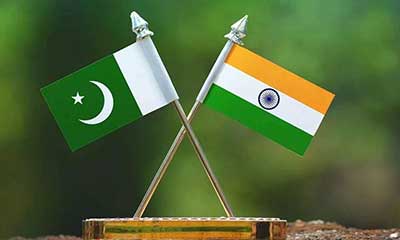Date: 13/05/2023
Relevance: GS-2: India and its Neighbourhood- relations
Key Phrases: Cross-Border Tensions, Compromised Regional Security, Diplomatic Channels, ASEAN nations, long-standing issues, Nationalistic sentiments, Soft Power and Cultural Exchange.
Why in News?
- Former Prime Minister Imran Khan's arrest triggered protests across Pakistan, leading to a political crisis.
- Imran Khan and his PTI party have been challenging the government of Prime Minister Shehbaz Sharif since being ousted from office.
- Khan's clashes with Pakistan's military have further complicated the political landscape.
- Economic crises and natural disasters have contributed to the unpopularity of Sharif's government.
Reasons behind Imran Khan's Arrest:
- Khan was arrested on corruption charges related to a money laundering case involving a prominent real estate figure.
- The arrest sparked widespread protests, resulting in casualties and arrests.
- Protestors targeted military properties, which further intensified the situation.
Current Developments in Pakistan:
- Imran Khan and senior leaders of his party are being questioned by the National Accountability Bureau.
- The army has been deployed to stabilize the domestic situation, but a long-term solution to address grievances is uncertain.
Implications for Pakistan's Politics:
- Some experts believe this crisis could be a turning point in the country's politics.
- The military's open confrontation with a popular national politician has drawn criticism.
- Prime Minister Sharif's absence during the crisis may impact his approval ratings.
Challenges For India:
- Escalation of Cross-Border Tensions:
- The political crisis may lead to a rise in cross-border tensions, particularly along the Line of Control (LoC) in Kashmir.
- Pakistan-based militant groups may exploit the internal instability to carry out attacks in India, posing security challenges.
- Compromised Regional Security:
- Instability in Pakistan could undermine regional security dynamics and intensify existing conflicts, such as those related to Kashmir.
- The crisis may divert Pakistan's attention from counterterrorism efforts, potentially enabling terrorist groups to operate more freely.
- Impacts on Peace Process:
- The political crisis could disrupt any existing peace processes or dialogues between India and Pakistan, hindering efforts to resolve long-standing issues.
- Nationalistic sentiments and public pressure in India may reduce the government's flexibility in engaging with Pakistan constructively.
Opportunities For India:
- Diplomatic Leverage:
- Pakistan's internal turmoil may provide India with an opportunity to strengthen its diplomatic position on matters concerning regional security.
- India can leverage Pakistan's crisis to highlight concerns about cross-border terrorism and promote international pressure on Pakistan to address these issues.
- Counterterrorism Cooperation:
- International partners may be more willing to collaborate with India in combating terrorism emanating from Pakistan, recognizing the urgency to address shared security threats.
- Enhanced intelligence sharing and cooperation could aid in curbing cross-border infiltration and preventing terrorist activities.
- Regional Power Projection:
- India can demonstrate its ability to maintain stability and handle regional challenges effectively, contrasting with the internal strife faced by Pakistan.
- Strengthening regional alliances and partnerships, particularly with countries in South Asia and the Middle East, could enhance India's position as a responsible regional power.
Possible Strategies for India to Navigate Pakistan's Political Crisis:
- Maintain Diplomatic Channels:
- India should continue to engage in diplomatic dialogue with Pakistan, even during times of political crisis, to ensure open lines of communication and prevent misunderstandings.
- Consistent diplomatic efforts can help de-escalate tensions and promote stability in the region.
- Strengthen Regional Alliances:
- India should strengthen its alliances with neighboring countries and regional powers to counter any potential negative impacts of Pakistan's political crisis.
- Collaborating with countries like the United States, Japan, and ASEAN nations can provide support and influence in the region.
- Focus on Economic Development:
- Emphasize economic growth and development within India to consolidate its position as a regional economic powerhouse.
- Strengthening domestic economic sectors and attracting foreign investments will enhance India's influence and resilience in the face of regional instability.
- Promote Soft Power and Cultural Exchange:
- Utilize soft power tools such as cultural exchange programs, people-to-people interactions, and educational initiatives to foster goodwill and understanding between the peoples of India and Pakistan.
- Promoting cultural ties can help bridge divides and create a conducive environment for dialogue and cooperation.
- Vigilance on Security Issues:
- Strengthen border security measures to mitigate potential security challenges arising from Pakistan's political crisis.
- Maintain a robust intelligence network to monitor and respond to any security threats or cross-border activities.
- Emphasize Regional Connectivity:
- Prioritize regional connectivity initiatives, such as infrastructure projects, transport networks, and energy collaborations, to enhance regional integration.
- Initiatives like the Chabahar Port project, the International North-South Transport Corridor, and the South Asian Association for Regional Cooperation (SAARC) can foster economic cooperation and reduce regional tensions.
- International Engagement:
- Engage with the international community, including multilateral forums like the United Nations, to highlight concerns and seek support for regional stability.
- Collaborate with like-minded countries to address shared challenges and promote a coordinated approach towards addressing issues related to Pakistan's political crisis.
- Track-II Diplomacy and Civil Society Engagement:
- Encourage people-to-people exchanges, cultural dialogues, and track-II diplomacy initiatives to foster understanding and trust between India and Pakistan.
- Engage with civil society organizations, academia, and non-governmental actors to facilitate dialogue and promote peaceful resolutions.
Conclusion:
- Pakistan's political crisis poses challenges and opportunities for India in terms of regional security and bilateral relations.
- While the crisis may escalate cross-border tensions and compromise regional stability, it also provides India with diplomatic leverage, opportunities for counterterrorism cooperation, and a chance to engage in constructive dialogue.
- India must carefully navigate these dynamics, balancing its security concerns with the pursuit of regional stability and the resolution of long-standing disputes.
Source: Live-Mint
Mains Question:
Q. Assess the potential implications of Pakistan's political crisis on India. Examine the challenges and opportunities it presents for India in terms of regional security and bilateral relations. (250 Words).







